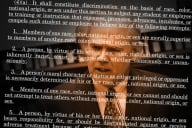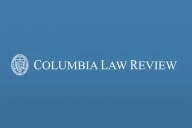You have /5 articles left.
Sign up for a free account or log in.
WASHINGTON, D.C. -- Collegiality can be a dirty word in higher education -- particularly in regard to tenure or promotion, where it frequently becomes a catchall for likability and other subjective qualities that some faculty advocates say can be used to punish departmental dissenters. But two researchers are trying – through data-based definitions and metrics – to sanitize collegiality enough for it to be a viable, fourth criterion in personnel decisions.
In academic departments, “what we want is productive dissent,” Robert Cipriano, professor emeritus and former chair of the department of recreation of leisure studies at Southern Connecticut State University, and author of Facilitating a Collegial Department in Higher Education: Strategies for Success, said during the American Association of University Professors’ annual meeting Thursday (where their push to formalize the role of collegiality in faculty employment decisions drew some skepticism from the assembled professors). “As passionate as the discussion is, it has to be respectful. You go to lunch and it’s over.”
Cipriano and his colleague, Richard Riccardi, director of Southern Connecticut State’s Office of Management Information and Research, have conducted several studies and written numerous articles about how department chairs deal with their jobs, including difficult personalities. Some 83 percent of department chairs in their current, national study of 528 chairs reported having or having had an uncivil or non-collegial professor in their department; in another, earlier study of 451 chairs, 79 percent said they would be in favor of having collegiality as a criterion for tenure and promotion if there was an “objective, validated tool” for assessing collegial behavior.
Clearly, Riccardi said, collegiality matters -- an idea outside research supports. Belonging to a collegial department figured higher in faculty satisfaction than did work and family policies, clear tenure policies and compensation, according to one cited study. Having just one “slacker or jerk” in the group can bring down the team’s overall performance by up to 40 percent, according to another.
Fostering a culture of productive dissent means first developing operational definitions of collegiality and civility – lest they be subject to the “I know it when I see it” test, coined by U.S. Supreme Court Justice Potter Stewart in reference to the hard-core pornography at issue in Jacobellis v. Ohio in 1964, Cipriano joked. As an adjective, “ 'collegial' indicates the way a group of colleagues take collective responsibility for their work together with minimal supervision from above.” Civility indicates politeness and courtesy, demonstrated by collaboration, speaking in a professional and respectful manner toward others and “stepping up” when needed, among other similar traits.
Non-collegial faculty consistently fail to demonstrate these traits, Cipriano said. “It’s not a bad day. It’s consistent behavior, over and over again, when that person is labeled a ‘jerk.’ ” Riccardi said uncivil behavior is on the rise, due to economic uncertainty, the “classic” mandate to do more with less, and less motivated and prepared students.
Developing definitions is only half the battle, however; they then have to be shared with faculty as expectations in faculty handbooks, collective bargaining agreements and contracts, Cirpriano said. Discussions of collegiality should be proactive, not just reactive or punitive. (Riccardi said that while department chairs is his current study largely reported proactive attempts to curve uncivil or non-collegial behavior, such as contacting the dean (80 percent of those dealing with or who have dealt with uncivil colleagues), provost or human resources, others attempted punitive measures, such as scrutinizing the use of personal or sick days (9 percent) and exclusion from social functions (3 percent).
In a separate, private venture, Cipriano and another partner also have launched the Collegiality Assessment Matrix and Self-Assessment Matrix. Each assessment tool features 10 statements designed to clearly assess the level of collegiality of a faculty member, for which the reviewer must select a level of agreement, on a scale of one to five.
Statements on the peer-review matrix include: “The faculty member speaks in a professional manner to others in his or her unit. For example, he or she avoids making remarks that are caustic, disparaging, undermining, or embarrassing." Statements on the self-assessment are similar and include: "I behave in a professional manner toward others in my unit. For example, I avoid such behaviors as frequent displays of anger or irritability, contemptuous or dismissive conduct, or the refusal to grant others in the unit common courtesies." The program has been adopted by institutions in Miami-Dade College, and in Saudi Arabia, he said.
As the Cipriano and Riccardi expected, their proposal to legitimize the “fourth rail” of tenure both faced both interest and criticism.
Robert Kreiser, associate secretary of academic freedom, tenure and governance at AAUP, found fault in the presenters’ ideal of “productive dissent.” Dissent doesn't always have to be productive, he said; furthermore, “[Your presentation] doesn’t make sufficiently strong distinctions between toxicity and unproductive dissent." (While it recognizes the value of collegiality, as demonstrated through successful execution of research, teaching and service, AAUP policy does not promote collegiality as a separate tenure criterion due to what it sees as its potential to promote homogeneity and chill debate and discussion.)
Pointing out that gadflies might not be collegial, Kreiser added: "Socrates could have been a jerk."
Donna Brauer, professor of nursing at Minnesota State University at Mankato, also said she was skeptical of the idea of collegiality as a tenure criterion, as well as a tool for measuring it, due to its ineffability. While other tenure criteria – research, teaching and service -- are “is” questions, she said, recalling Hume’s law, collegiality is an “ought” question. “You can’t devise a tool to answer an ‘ought’ question."
Larry Backer, professor of law and international politics at Pennsylvania State University, said that formally incorporating collegiality into personnel decisions was “beautiful in theory,” but – in the absence of similar standards for administrators – could make faculty vulnerable to “perversion” of such codes by bosses who would use them to their own ends.
Of the criticism, Cipriano said, “This is controversial, especially with AAUP’s stand against this.” But, he said, “We’re here to present both sides of the coin and to discuss where [collegiality] could fit in” in personnel discussions.
Whether or not it’s explicitly counted in such decisions, Riccardi said, “They’re already using it.” (Cipriano added that numerous courts, including the U.S Court of Appeals for the Fourth Circuit in 1981, in Mayberry v. Dees, have upheld a university’s right to deny tenure based on collegiality, or lack thereof).
Additionally, Riccardi said, students are bound to codes of conduct, which often emphasize respect. Holding faculty to the same standards could be a “teachable moment.”









